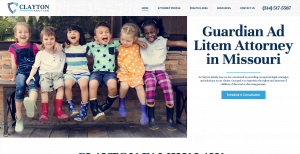
Missouri Rules of Professional Conduct
Before you start a marketing plan for your law firm, you’ll want to make sure you understand all of the Missouri Bar guidelines for internet advertising. Luckily, a trusted marketing firm can help you understand these guidelines, as well as create a website that adheres to all of the Bar rules.
For example, if you wish to publish an advertisement, you must submit it to the Bar beforehand.
More information on this and other regulations can be found using the resources listed below.
Resources
Missouri Bar Association Rules of Professional Conduct – Here you’ll find the complete list of the rules in Missouri
Missouri Ethics Opinions – If you have further questions after reading through the rules, this will be a helpful resource
Key Rules to be Aware of

Rule 4-7.1 – Information About Legal Services – Communication Concerning a Lawyer’s Services
A lawyer shall not make a false or misleading communication about the lawyer or the lawyer’s services.
A communication is false if it contains a material misrepresentation of fact or law.
A communication is false or misleading if it:
(a) omits a fact as a result of which the statement considered as a whole is materially misleading;(b) is likely to create an unjustified expectation about results the lawyer can achieve;(c) proclaims results obtained on behalf of clients, such as the amount of a damage award or the lawyer’s record in obtaining favorable verdicts or settlements, without stating that past results afford no guarantee of future results and that every case is different and must be judged on its own merits;(d) states or implies that the lawyer can achieve results by means that violate the Rules of Professional Conduct or other law;(e) compares the quality of a lawyer’s or a law firm’s services with other lawyers’ services, unless the comparison can be factually substantiated;(f) advertises for a specific type of case concerning which the lawyer has neither experience nor competence;(g) indicates an area of practice in which the lawyer routinely refers matters to other lawyers, without conspicuous identification of such fact;(h) contains any paid testimonial about or endorsement of the lawyer, without conspicuous identification of the fact that payment has been made for the testimonial or endorsement;(i) contains any simulated portrayal of a lawyer, client, victim, scene, or event without conspicuous identification of the fact that it is a simulation;(j) provides an office address for an office staffed only part-time or by appointment only, without conspicuous identification of such fact; or(k) states that legal services are available on a contingent or no-recovery-no-fee basis without stating conspicuously that the client may be responsible for costs or expenses, if that is the case.The presumptions that statements are misleading contained in Rule 4-7.1(c), (g), (h), and (k) shall not apply to a not-for-profit organization funded in whole or in part by the Legal Services Corporation established by 42 U.S.C section 2996(b) or to pro bono services provided free of charge by a not-for-profit organization, a court-annexed program, a bar association, or an accredited law school.
Rule 4-7.2 – Information About Legal Services – Advertising
(a) Subject to the requirements of Rule 4-7.1, a lawyer may advertise services through public media, such as a telephone directory, legal directory, newspaper or other periodical, outdoor advertising, radio, or television, or through direct mail advertising distributed generally to persons not known to need legal services of the kind provided by the lawyer in a particular matter.(b) A copy or recording of an advertisement or written communication shall be kept for two years after its last dissemination along with a record of when and where it was used. The record shall include the name of at least one lawyer responsible for its content unless the advertisement or written communication itself contains the name of at least one lawyer responsible for its content.(c) A lawyer shall not give anything of value to a person for recommending the lawyer’s services, except that:(1) a lawyer may pay the reasonable cost of advertising or written communication permitted by this Rule 4-7.2;(2) a lawyer may pay the reasonable cost of advertising, written communication, or other notification required in connection with the sale of a law practice as permitted by Rule 4-1.17; and(3) a lawyer may pay the usual charges of a qualified lawyer referral service registered under Rule 4-9.1 or other not-for-profit legal services organization.(d) A lawyer may not, directly or indirectly, pay all or a part of the cost of an advertisement in the public media unless such advertisement discloses the name and address of the financing lawyer, the relationship between the advertising lawyer and the financing lawyer, and whether the advertising lawyer is likely to refer cases received through the advertisement to the financing lawyer. Similarly, in any communications such as television, radio, or other electronic programs purporting to give the public legal advice or legal information, for which programs the broadcaster receives any remuneration or other consideration, directly or indirectly, from the lawyer who appears on those programs, the lawyer shall conspicuously disclose to the public the fact that the broadcaster has been paid or receives consideration from the lawyer appearing on the program.(e) A lawyer or law firm shall not advertise the existence of any office other than the principal office unless:(1) that other office is staffed by a lawyer at least three days a week, or(2) the advertisement states:(A) the days and times during which a lawyer will be present at that office, or(B) that meetings with lawyers will be by appointment only.(f) Any advertisement or communication made pursuant to this Rule 4-7.2, other than written solicitations governed by the disclosure rules of Rule 4-7.3(b), shall contain the following conspicuous disclosure:“The choice of a lawyer is an important decision and should not be based solely upon advertisements.”
(g) The disclosures required by Rule 4-7.2(e) and (f) need not be made if the information communicated is limited to the following:(1) the name of the law firm and the names of lawyers in the firm;(2) one or more fields of law in which the lawyer or law firm practices;(3) the date and place of admission to the bar of state and federal courts; and(4) the address, including e-mail and web site address, telephone number, and office hours.(h) Any words or statements required by Rules 4-7.1, 4-7.2, or 4-7.3 to appear in an advertisement or direct mail communication must appear in the same language in a which the advertisement or direct mail solicitation appears. If more than one lanquage is used in an advertisement or direct mail communication, any words or statements required by Rules 4-7.1 to 4-7.6 must appear in each language used in the advertisement or direct mail communication.(i) The provisions of Rule 4-7.2 shall not apply to services provided by a not-for-profit organization funded in whole or in part by the Legal Services Corporation established by 42 U.S.C. section 2996(b) or to pro bono services provided free of charge by a not-for-profit organization, a court-annexed program, a bar association, or an accredited law school.The provisions of Rule 4-7.2 shall not apply to law firms or lawyers who promote, support or publicize through advertising that substantially and predominantly features any of the following: legal services corporation; community or other non-profit organization; recognized community events or celebrations; institutions; entities; or individuals other than themselves.
Check out some of our favorite Missouri lawyer website designs








